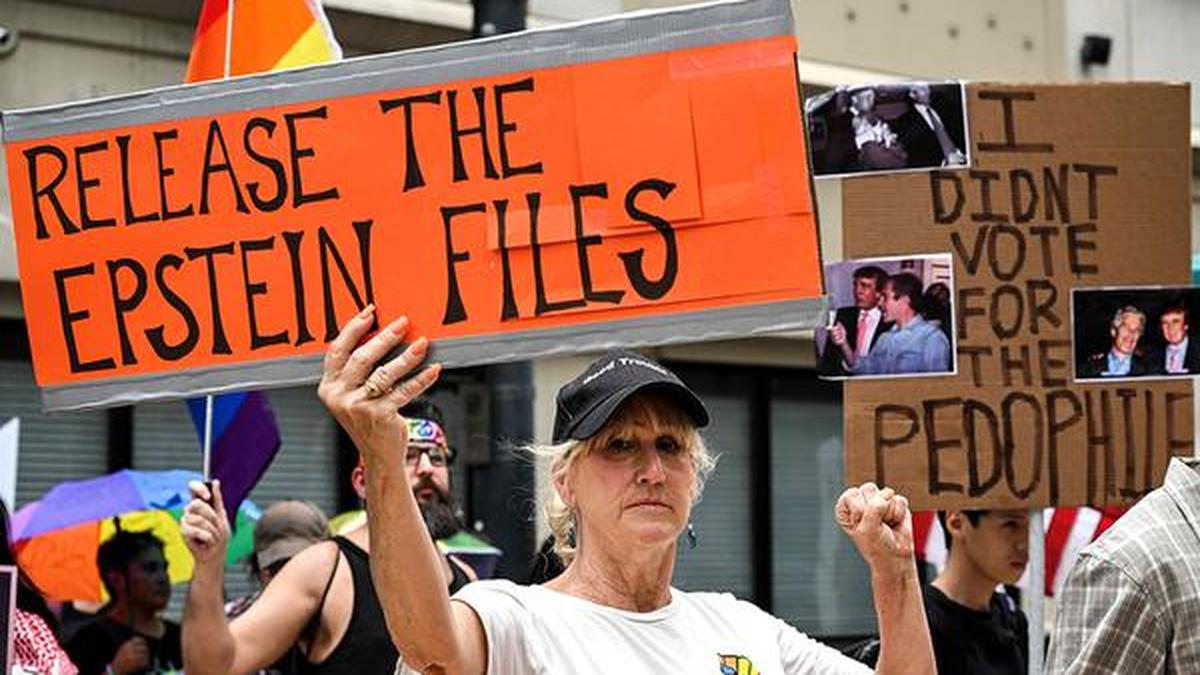
Call for action: People calling for the release of Espstein files participate in a protest in Houston, Texas.
| Photo Credit: RONALDO SCHEMIDT
In Washington, U.S. lawmakers have escalated pressure on the Justice Department over the Jeffrey Epstein files following multiple emerging developments: Attorney General Pam Bondi reportedly informed Donald Trump in May that his name appears in internal Epstein records; Republicans ended a House session early amid internal conflict over a vote on pressing DOJ disclosures; and Justice Department officials met with imprisoned Epstein associate Ghislaine Maxwell to explore possible leads. Against this backdrop, bipartisan calls have intensified for Bondi to testify before Congress
Also Read: Republican rumblings: on Trump and the Epstein files
What is the background of the Jeffrey Epstein case?
Jeffrey Epstein, a convicted sex offender, died by suicide in a federal jail in August 2019 while awaiting trial on federal sex-trafficking charges. He was previously convicted in 2008 in Florida for soliciting a minor, serving a controversial sentence that allowed him work release. Epstein’s re-arrest in 2019 reignited public scrutiny over how he operated an alleged trafficking ring for years, often involving underage girls, with little accountability.
Since his death, questions have remained about the extent of his connections, including to prominent global figures, and whether U.S. authorities have withheld critical information. In February 2025, the DOJ released an initial batch of declassified documents, including redacted flight logs and Epstein’s contact book. However, many of these materials were already public.
What are the latest developments in the Epstein files investigation?
- Congressional subpoena: On July 23, the House Oversight Subcommittee formally subpoenaed the DOJ, demanding the release of all Epstein-related records, including sealed files, internal DOJ communications, and evidence not yet made public.
- Maxwell to testify: Ghislaine Maxwell, the imprisoned former girlfriend of Epstein, is expected to testify before Congress on August 11. A closed-door interview with Deputy Attorney General Todd Blanche has already taken place.
- Trump’s name in files: U.S. President Donald Trump was told in May 2025 that his name appears “multiple times” in the Epstein files. The White House has acknowledged the inclusion but emphasised that it is based on unverified references.
- Court rejects file unsealing: A Florida judge has blocked the DOJ’s request to unseal grand jury records, citing legal protections. A similar petition remains under review in New York.
- $1.5 billion in suspicious transactions: Senator Ron Wyden has alleged that Treasury Department documents indicate over $1.5 billion in wire transfers tied to Epstein’s network. He claims the DOJ has withheld these suspicious activity reports (SARs) from Congress.
What do the Jeffrey Epstein files contain?
According to the DOJ, the Epstein files include over 300 gigabytes of digital content and tens of thousands of images and videos, many involving minors and explicit content. The seized physical materials include flight manifests, photo albums, architectural plans of Epstein’s residences, cash bundles, and contact directories. Authorities say that most of these materials remain sealed due to their illicit nature and the need to protect the victims’ identities.
What happens next in the Epstein investigation?
The US House Oversight Subcommittee’s subpoena may require the Department of Justice (DOJ) to release more documents related to the Jeffrey Epstein case, unless blocked by the courts. Ghislaine Maxwell is expected to testify before Congress in August. Her closed-door meeting with Deputy Attorney General Todd Blanche in Florida was part of the DOJ’s ongoing efforts to respond to calls for transparency.

Mr Blanche said on social media that President Donald Trump had asked officials to “release all credible evidence”. He added that the FBI and DOJ would review any information Maxwell provides on crimes involving victims.
Also Read: Pam Bondi | Bonding for cover
Meanwhile, lawmakers Thomas Massie and Ro Khanna have introduced the “Epstein Files Transparency Act”. If supported by 218 members of the House of Representatives, it would direct the Attorney General to release all unclassified DOJ records related to Epstein. The outcome will influence how much more information becomes public in the coming months.
Published – July 25, 2025 01:49 pm IST



